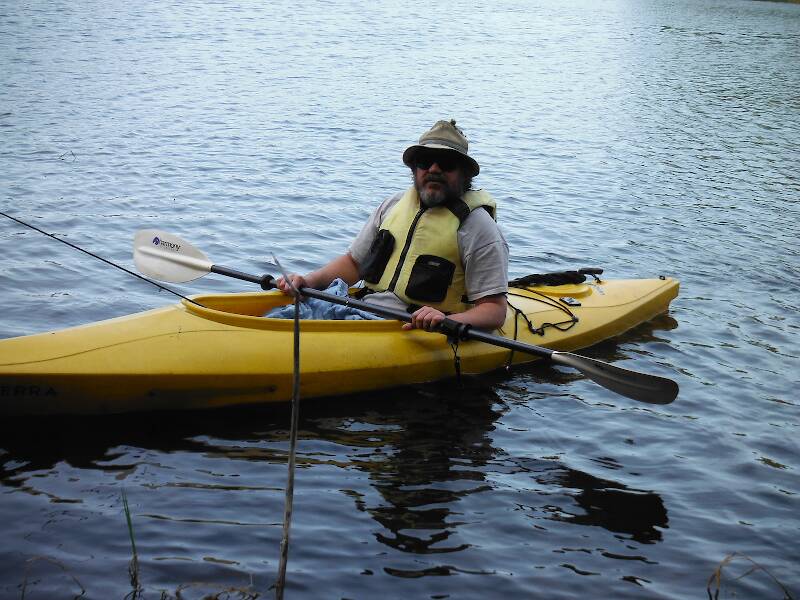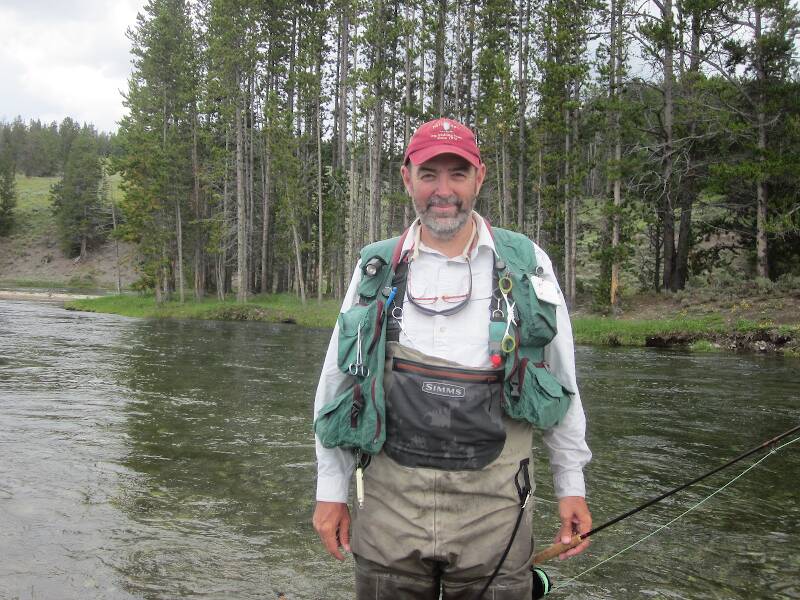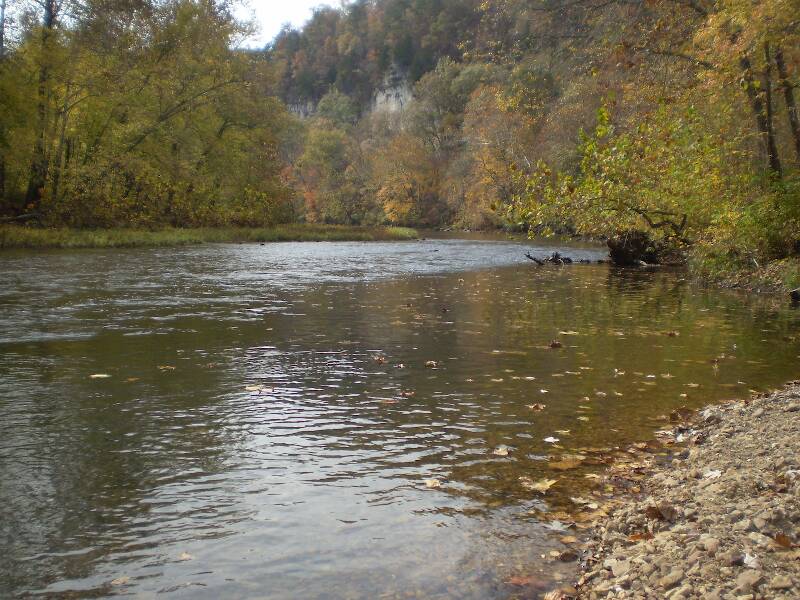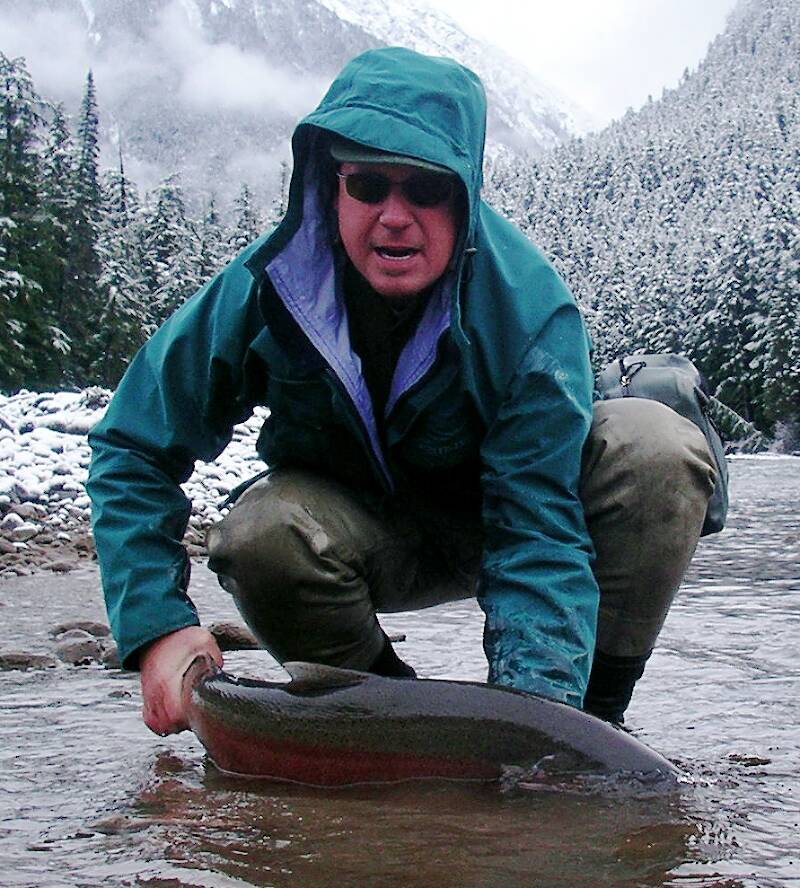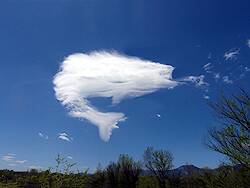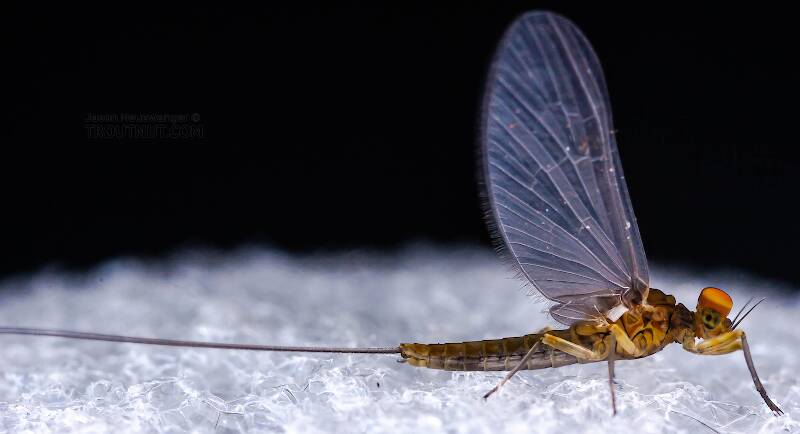
Blue-winged Olives
Baetis
Tiny Baetis mayflies are perhaps the most commonly encountered and imitated by anglers on all American trout streams due to their great abundance, widespread distribution, and trout-friendly emergence habits.
Featured on the forum
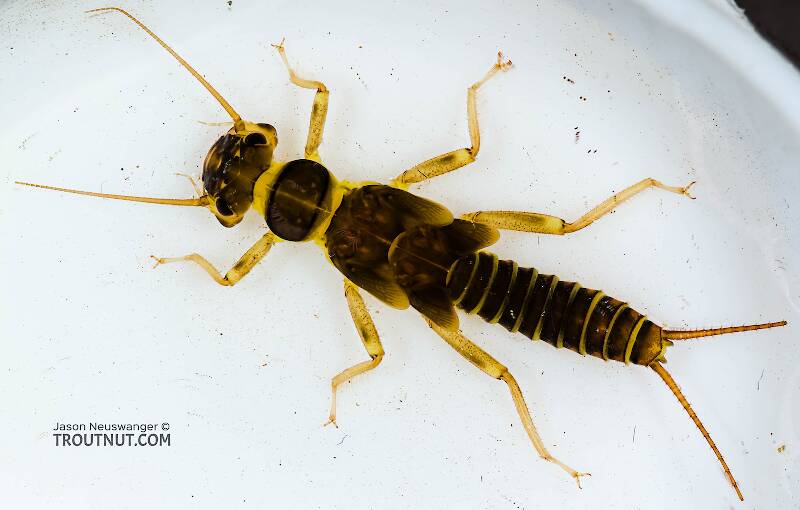
This one pretty clearly keys to Kogotus, but it also looks fairly different from specimens I caught in the same creek about a month later in the year. With only one species of the genus known in Washington, I'm not sure about the answer to this ID.

Troutnut is a project started in 2003 by salmonid ecologist Jason "Troutnut" Neuswanger to help anglers and
fly tyers unabashedly embrace the entomological side of the sport. Learn more about Troutnut or
support the project for an enhanced experience here.
Troutnut on Jul 23, 2010July 23rd, 2010, 12:10 pm EDT
While poking around the latest scientific articles to answer another question that came up, I found this one:
Long story short: Get them back in the water pretty quickly and they'll be fine.
Caveat: I don't think this study was done at stressful temperatures, at which the results might be different. My journal access is acting up so I can't get the full article right now to check.
Author(s): Wedemeyer GA (Wedemeyer, Gary A.)1, Wydoski RS (Wydoski, Richard S.)2
Source: NORTH AMERICAN JOURNAL OF FISHERIES MANAGEMENT Volume: 28 Issue: 5 Pages: 1587-1596 Published: OCT 2008
Times Cited: 3 References: 33
Abstract: Catch-and-release fishing regulations are widely used by fishery resource managers to maintain both the quantity and quality of spoil fish populations. We evaluated blood chemistry disturbances in wild brook trout Salvelinus fontinalis, brown trout Salmo trutta, cutthroat trout Oncorhynchus clarkii, and Arctic grayling Thymallus arcticus that had been hooked and played for 1-5 min in waters of the intermountain western United States. A hatchery stock of brown trout was included for comparison. To assess time needed for recovery, additional test groups were played for 5 min and then released into net-pens, where they were held for up to 72 It. The osmoregulatory and metabolic disturbances associated with catch-and-release fishing under the conditions we tested were minimal and judged to he well within normal physiological tolerance limits. In fish that were held for recovery, the blood chemistry alterations that did occur appeared to be related to stress from confinement in the net-pens. Our results confirm the results of previous studies, showing that prerelease air exposure and handling cause more physiological stress than does either hooking per se or playing time. Fishery managers must be aware of the differences in the perceptions, attitudes, and values Of different societal groups, some of which feel that catch-and-release fishing should be banned because it is cruel to the animals. On the basis of brain anatomy, it seems highly unlikely that fish experience pain in the same manner as humans experience it, because fish lack a neocortex, the brain structure that enables the sensation of pain in higher vertebrates. However, independent of the neurobiological argument. our results indicate that under conditions similar to those tested, fish subjected to catch and release are neither suffering nor particularly stressed. Improved education programs about the relatively benign physiological effects of catch-and-release fishing as a Fishery management practice would be beneficial to anglers and the nonfishing public alike.
Reprint Address: Wedemeyer, GA (reprint author), US Geol Survey, Western Fisheries Res Ctr, 6505 NE 65th St, Seattle, WA 98115 USA
Addresses:
1. US Geol Survey, Western Fisheries Res Ctr, Seattle, WA 98115 USA
2. Utah State Univ, US Geol Survey, Utah Cooperat Fish & Wildlife Res Unit, Logan, UT 84322 USA
Long story short: Get them back in the water pretty quickly and they'll be fine.
Caveat: I don't think this study was done at stressful temperatures, at which the results might be different. My journal access is acting up so I can't get the full article right now to check.
Jason Neuswanger, Ph.D.
Troutnut and salmonid ecologist
Troutnut and salmonid ecologist
Jmd123 on Jul 23, 2010July 23rd, 2010, 1:27 pm EDT
These days, actually for the past four years, I have been using a Measure-Net, which is made of nice soft mesh and includes an inch scale down the center. Fish can be measured, unhooked, and promptly released, all without having to hardly remove them from the water at all or put my hands (always thoroughly wet) on them.
Jonathon
Jonathon
No matter how big the one you just caught is, there's always a bigger one out there somewhere...
Shawnny3 on Jul 24, 2010July 24th, 2010, 1:14 am EDT
I don't think this study was done at stressful temperatures, at which the results might be different.
As relevant as that is, it's a pretty glaring omission in the abstract. If you find out any more about high-temp stress, please share it with us. I'm doing most of my fishing in summer, and I'm concerned about it. I know that most people use the 70-degree line as a rule-of-thumb, but I would like to know how well supported that cutoff is by actual research.
-Shawn
Jewelry-Quality Artistic Salmon Flies, by Shawn Davis
www.davisflydesigns.com
www.davisflydesigns.com
Oldredbarn on Jul 26, 2010July 26th, 2010, 2:59 am EDT
Thanks Jason...Interesting stuff.
I think that seasoned anglers that practise catch-and-release are aware that getting the fish back in the water ASAP is a good idea.
Unfortunately I have seen guys handle fish for way too long in other situations. There is an early season stocked fish program near here where brood stock are placed in a small lake and from April 1-last Saturday in April you are supposed to practise catch and release and then you can keep the fish...In terms of cruelty I haven't seen anything quite like it elsewhere. The fish look so bad killing them would be the least you could do...Stumpy fins, lethargy, gill covers missing...Ouch! It's pretty bad...
I have watched as guys show off a fish they just caught to friends and I'm in my float tube going "one-thousand-one, one-thousand-two...That fish is dead..." I've seen them try to put them back in only to have them tip over...Food for the critters along shore I guess.
It doesn't IMHO promote good angling habits and is down right hard to watch. Education...When I'm feeling optimistic may work...Today I'm not in an optimistic state-of-mind so I'll stop here.
Spence
I think that seasoned anglers that practise catch-and-release are aware that getting the fish back in the water ASAP is a good idea.
Unfortunately I have seen guys handle fish for way too long in other situations. There is an early season stocked fish program near here where brood stock are placed in a small lake and from April 1-last Saturday in April you are supposed to practise catch and release and then you can keep the fish...In terms of cruelty I haven't seen anything quite like it elsewhere. The fish look so bad killing them would be the least you could do...Stumpy fins, lethargy, gill covers missing...Ouch! It's pretty bad...
I have watched as guys show off a fish they just caught to friends and I'm in my float tube going "one-thousand-one, one-thousand-two...That fish is dead..." I've seen them try to put them back in only to have them tip over...Food for the critters along shore I guess.
It doesn't IMHO promote good angling habits and is down right hard to watch. Education...When I'm feeling optimistic may work...Today I'm not in an optimistic state-of-mind so I'll stop here.
Spence
"Even when my best efforts fail it's a satisfying challenge, and that, after all, is the essence of fly fishing." -Chauncy Lively
"Envy not the man who lives beside the river, but the man the river flows through." Joseph T Heywood
"Envy not the man who lives beside the river, but the man the river flows through." Joseph T Heywood
Jmd123 on Jul 26, 2010July 26th, 2010, 8:38 am EDT
I've seen some pretty poor fish handling myself recently, Spence. I watched some young punks let a nice bass fall on the ground, then flop it's way several yards back to the water on it's own, in my favorite local lake a few months ago. I thought about giving them a piece of my mind, but it was far too nice a day for a fistfight and I was catching bluegill & crappie hand-over-fist on my 3-weight...didn't want to spoil my own fun!
Jonathon
Jonathon
No matter how big the one you just caught is, there's always a bigger one out there somewhere...
Motrout on Jul 26, 2010July 26th, 2010, 9:52 am EDT
My favorite is when people grab fish from the water by the gill covers, hoist them out of the water, let the fish thrash around in the bottom of the boat for a few minutes, take a picture, and then let it go. And then they go on for a few minutes about the value of catch and release, when the fish they caught is almost sure to die a slow, painful, and unseen death.
If you watch fishing shows on the Outdoor Channel, you will see this all the time. And that is the example set for new fisherman who don't know how to handle fish.
If you watch fishing shows on the Outdoor Channel, you will see this all the time. And that is the example set for new fisherman who don't know how to handle fish.
"I don't know what fly fishing teaches us, but I think it's something we need to know."-John Gierach
http://fishingintheozarks.blogspot.com/
http://fishingintheozarks.blogspot.com/
Jmd123 on Jul 26, 2010July 26th, 2010, 6:03 pm EDT
Makes you wanna go thump 'em in the head, doesn't it, MO?
Once, in Missouri in fact (this is no comment on the general fishing population there, BTW, I met many good guys while living there), I saw some dumbass college kid slamming bluegill against the dock instead of just tossing them back in the water! WHAT THE F*CK IS HE DOING??? I said to my (now ex-) wife...I asked the little dumbf*ck just why the hell he was doing that (trying not to go out and physically throw him off the dock while cursing at the top of my lungs and issuing bodily threats to said youngster), and his idiotic response was, "Uh , I dunno, my grampa always did that." "Well, you're KILLING THEM!!" "Uh, gee, I don't see any floating up!" "They SINK FIRST, dummy! STOP DOING THAT!! I FISH HERE TOO!!!" "Uh, OK!"
He's just lucky he didn't get assualted that day, let me tell you...
Jonathon
Once, in Missouri in fact (this is no comment on the general fishing population there, BTW, I met many good guys while living there), I saw some dumbass college kid slamming bluegill against the dock instead of just tossing them back in the water! WHAT THE F*CK IS HE DOING??? I said to my (now ex-) wife...I asked the little dumbf*ck just why the hell he was doing that (trying not to go out and physically throw him off the dock while cursing at the top of my lungs and issuing bodily threats to said youngster), and his idiotic response was, "Uh , I dunno, my grampa always did that." "Well, you're KILLING THEM!!" "Uh, gee, I don't see any floating up!" "They SINK FIRST, dummy! STOP DOING THAT!! I FISH HERE TOO!!!" "Uh, OK!"
He's just lucky he didn't get assualted that day, let me tell you...
Jonathon
No matter how big the one you just caught is, there's always a bigger one out there somewhere...
Neophyte on Jul 27, 2010July 27th, 2010, 12:22 am EDT
Jason,
If you haven't read "Do Fish Feel Pain", by Victoria Braithwaite, you might find it an interesting read.
Ray
If you haven't read "Do Fish Feel Pain", by Victoria Braithwaite, you might find it an interesting read.
Ray
RayM
Motrout on Jul 27, 2010July 27th, 2010, 3:55 pm EDT
I've seen things very similar to that. Sometimes folks will actually see how far they can throw a fish they want to release. Many years ago, I once went fishing with a (former)friend. I caught a bass. This was before I became a catch and release fisherman, so I was dissapointed to find that it was an inch short of the length limit. My friend was really mad about that, and he wanted me to see how far across the lake I could throw it. He seemed pretty dismayed when I gently released the fish without so much as an underhand toss. Ever since then, I have made a concerted effort to never remove the fish from the water before release. The more time the fish spends out of the water, the more likely it is to die. And that's even more true in the warm water conditions that are prevalent right now.
As you may have guessed, the two of us haven't fished together since.
As you may have guessed, the two of us haven't fished together since.
"I don't know what fly fishing teaches us, but I think it's something we need to know."-John Gierach
http://fishingintheozarks.blogspot.com/
http://fishingintheozarks.blogspot.com/
Jmd123 on Jul 27, 2010July 27th, 2010, 5:01 pm EDT
I make it a habit, MO, to exclude dummies and idiots from my circle of friends...
Jonathon
Jonathon
No matter how big the one you just caught is, there's always a bigger one out there somewhere...
Overmywader
Posts: 31
Posts: 31
Overmywader on Mar 13, 2014March 13th, 2014, 9:42 am EDT
Jason,
Are you familiar with these studies on catch and release stress.
http://overmywaders.com/extracts/nelson/FME_Meka&Margraf2007.pdf
http://overmywaders.com/extracts/nelson/FME_Pollock&Pine2007.pdf
http://overmywaders.com/extracts/nelson/FME_PopeEtAl2007.pdf
http://overmywaders.com/extracts/nelson/FME_Cooke&Schramm2007-C&R_Science.pdf
Are you familiar with these studies on catch and release stress.
http://overmywaders.com/extracts/nelson/FME_Meka&Margraf2007.pdf
http://overmywaders.com/extracts/nelson/FME_Pollock&Pine2007.pdf
http://overmywaders.com/extracts/nelson/FME_PopeEtAl2007.pdf
http://overmywaders.com/extracts/nelson/FME_Cooke&Schramm2007-C&R_Science.pdf
Jmd123 on Mar 13, 2014March 13th, 2014, 12:48 pm EDT
Mack, they make tools specifically for just what you do, there's one called the Ketchum Release that just fits over the hook and allows you to pop it out without hardly contacting the fish at all.
http://waterworks-lamson.com/products/accesories/
(Yes, I know "accessories" is misspelled...that's how it is on the website)
Jonathon
http://waterworks-lamson.com/products/accesories/
(Yes, I know "accessories" is misspelled...that's how it is on the website)
Jonathon
No matter how big the one you just caught is, there's always a bigger one out there somewhere...
Entoman on Mar 13, 2014March 13th, 2014, 5:32 pm EDT
Behnke talked at length about stress in several papers and articles. Water/ air temps are the single biggest factor in stress related mortality. During high temps that are marginal, it's best not to go fishing. Frankly, even "early release" fish that are never touched and only on for a short time can be in trouble.
This is anecdotal, but a kept trout in a pond I used to have that were handled pretty roughly by kids hundreds of times during the Winter to no ill effect. They grew and thrived just fine.
This is anecdotal, but a kept trout in a pond I used to have that were handled pretty roughly by kids hundreds of times during the Winter to no ill effect. They grew and thrived just fine.
"It's not that I find fishing so important, it's just that I find all other endeavors of Man equally unimportant... And not nearly as much fun!" Robert Traver, Anatomy of a Fisherman
PaulRoberts on Mar 13, 2014March 13th, 2014, 6:01 pm EDT
Chronic stress such as in spawning can be an issue too.
And some species are more fragile than others. I found Coho's to be unable to be out of the water long at all, compared to other salmonids, although I wonder if that's generally true or just when I've caught them. But I think I remember this being true of Coho parr as well during a sampling excursion. And I think landlocked Atlantic's too.
Largemouth bass, on the other hand, in one study, were found to have high long term survival rates following up to 10min held out of the water!
As to handling healthy fish, wet hands are usually enough. It's squeezing, dropping, repeated capture (bass on spawning beds), and fish played too long and/or held out to be ogled too long, that can kill fish.
I wonder what it is about Alaskan rainbows in the literature? Is it the fish, the fishing methods, the season, the environment, or the penchant of the researchers?
And some species are more fragile than others. I found Coho's to be unable to be out of the water long at all, compared to other salmonids, although I wonder if that's generally true or just when I've caught them. But I think I remember this being true of Coho parr as well during a sampling excursion. And I think landlocked Atlantic's too.
Largemouth bass, on the other hand, in one study, were found to have high long term survival rates following up to 10min held out of the water!
As to handling healthy fish, wet hands are usually enough. It's squeezing, dropping, repeated capture (bass on spawning beds), and fish played too long and/or held out to be ogled too long, that can kill fish.
I wonder what it is about Alaskan rainbows in the literature? Is it the fish, the fishing methods, the season, the environment, or the penchant of the researchers?
Jmd123 on Mar 13, 2014March 13th, 2014, 6:27 pm EDT
Dystopian, Paul...Homo sapiens is very poor at engineering the natural world. Mother nature really knows best and we don't. At least in my experience.
Jonathon
Jonathon
No matter how big the one you just caught is, there's always a bigger one out there somewhere...
Entoman on Mar 13, 2014March 13th, 2014, 9:49 pm EDT
Thanks for the post, Jason.
"It's not that I find fishing so important, it's just that I find all other endeavors of Man equally unimportant... And not nearly as much fun!" Robert Traver, Anatomy of a Fisherman
Quick Reply
Related Discussions
Topic
Replies
Last Reply
2
Mar 10, 2008
by Joec
by Joec
2
Dec 29, 2020
by Troutnut
by Troutnut



